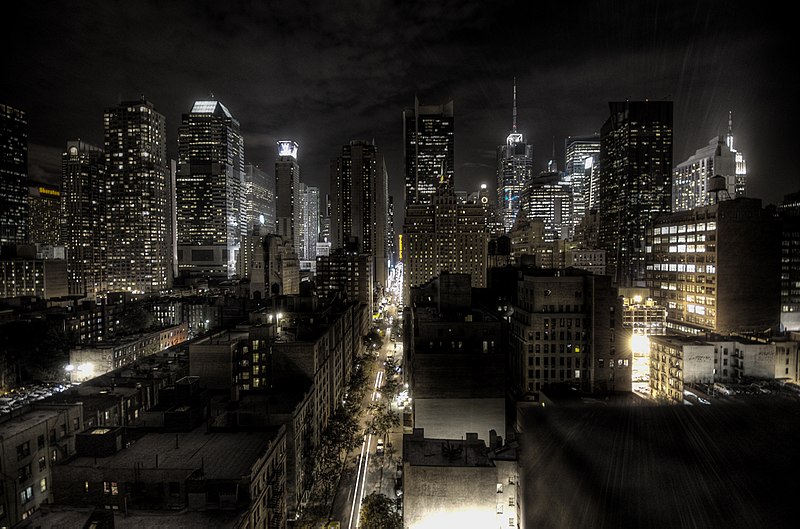Cover Photo: New York City at night, taken on 31 August 2006 by Paulo Barcellos Jr. from Wikimedia, Volume 5, Number 2: December 2020 | Op-Ed
Do we know what’s best for ourselves? In modern society, we have been raised to embrace materialism, we have been taught that consuming more is good—that it should be our dream to be independent with a big house, a nice car, and the newest phone. However, did all this come at a cost? As economists, we have been taught to consider opportunity costs, but do we apply this to institutions? This op-ed argues that urbanites from all classes are working against their own best interests by living disconnected urban lifestyles.
Starting off, we set some assumptions. Firstly, social needs are valued over materialism, with class preferences. Secondly, institution change is possible when the rich desire change or there is enough outcry from the mass. Thirdly, the imaginary city in question reaches a stable locational equilibrium with moderate population growth. Finally, the city has no iconic entertainment involving animals.
Our analysis begins with urbanization, which occurs when self-sufficiency breaks down when there is an agricultural surplus that can be transported to cities efficiently enough to reap the benefits of labor specialization and spatial concentration. This is commonly associated with cheaper goods, higher wages, and economic growth. Rarely would people ever see sustainability and ethical implications. Taking the food on our plate for example, do we usually take severe soil degradation, greenhouse gas emissions, overfishing, overgrazing, and animal abuse into consideration before consumption? Of course, doing so would make us limit our consumption and the growth imperative of capitalism wouldn’t like that. However, at the same time, we also have a stake in ignoring the issues for they can cause psychological discomfort, which may vary depending on the level of social acceptance. The abusive practices become unacceptable when urban lifestyles are directly threatened, and a certain crisis happens to fit the bill.
In a global pandemic, it should be more obvious that capitalism and environmental sustainability don’t go well together, especially when urbanites are so removed from nature that they may not be aware of zoonotic spillover risks from deforestation and animal cruelty. Thus, improving ecological literacy is very important. Of course, it wouldn’t be an easy task considering corporate control over ideological institutions. However, the question this op-ed asks then is it really in capitalists’ interest to value short-term gains and let the world die out? The next question we have to ask is how connected are they to climate change news, and do they think they can be exempted from the downfall of civilized society? Do they not have any children that will suffer in the future?
This op-ed view materialism as self-destructive in many ways. As a start, it fuels the growth imperative, which exhausts limited resources and creates pollution. Furthermore, there is the issue of positional externality as people become less happy with their relative consumption levels. This is especially problematic against goods that are best left as non-positional like housing as it makes them less affordable for the poor. Finally, it habituates people to solve problems through their purchasing power. This means that instead of working on their mental health, they may consume drugs.
Workers generally find cities appealing because of better job opportunities, which for the poor may possibly mean a difference between homelessness and starvation or a decent life for their family. Unfortunately, the shareholder class inside rich gated neighborhoods are unlikely to empathize with them, and may even exploit them due to being disconnected from the workplace. This op-ed argues that this is self-destructive due to the threat of revolution and urban crime. Not only can a thriving wage reduce the resentment the poor feel toward the rich, but it may also increase their productivity if this goes alongside transformative workplace culture. This should make it easier for them to sleep comfortably at night without needing a gun under the pillow or security guards. However, dealing with the root of the disconnect would require empathy from both sides, challenging the first assumption’s preference condition.
The op-ed certainly has some questionable ideas such as the rich being deterred from extractive actions against the general population when they have heightened security. Additionally, the likeliness of revolution needs to examined more deeply. An aspect of capitalism not focused much here is the elites’ control over ideological institutions that can divide the general population. However, as this op-ed focuses on pointing out self-destruction, it is implied that shareholders incur a psychological cost in the form of restless guilt from their deliberate exploitation of the poor. Hence, they imagined a scenario of revolution and crime.
People have different levels of connections to institutions. For the elite few who enjoyed extracting through capitalism, letting go sounds preposterous. For the average person who benefitted very little, it may be time to revolt. Making a collective decision sounds downright impossible as society becomes more complex and disconnected. It’s quite ironic that despite being known for agglomeration, cities facilitate disconnections in people’s lifestyles. Maybe, it’s time to reverse the trend.
References
Illing, S. (2018, April 18). Why a leading political theorist thinks civilization is overrated. Vox. https://www.vox.com/conversations/2017/11/22/16649038/civilization-progress-humanity-history-technology
Vittor, A. Y., Laporta, G. Z., & Sallum, M. A. M. (2020, June 25). How deforestation helps deadly viruses jump from animals to humans. The Conversation. https://theconversation.com/how-deforestation-helps-deadly-viruses-jump-from-animals-to-humans-139645
Jennings, S., Cottee, J., Cutis, T., & Miller, S. (2015, April) Food in an Urbanized World. http://www.fao.org/fileadmin/templates/agphome/documents/horticulture/crfs/foodurbanized.pdf











































